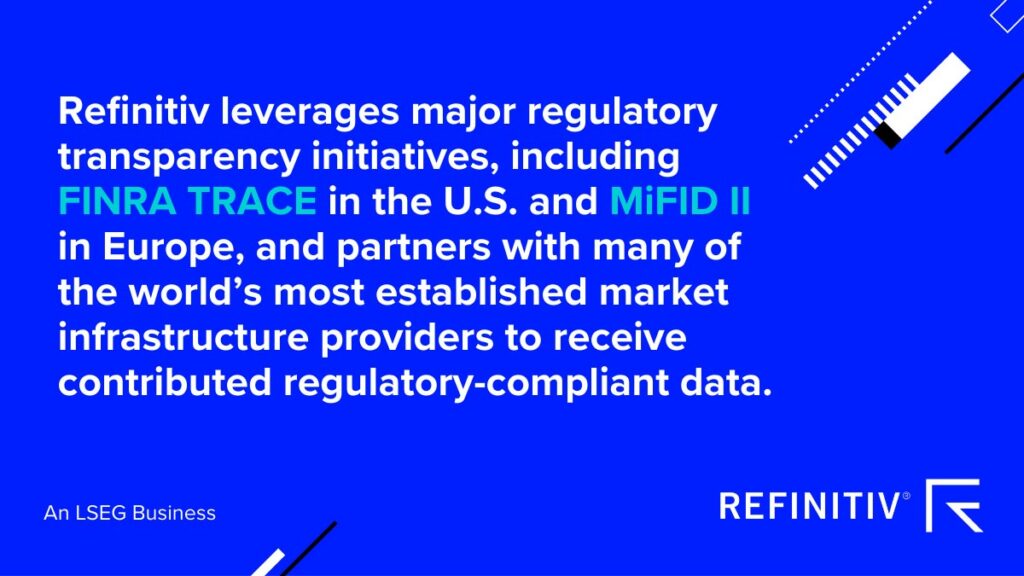
 By Fausto Marseglia, Head of Product Management, FRTB and Regulatory Propositions, Refinitiv.
By Fausto Marseglia, Head of Product Management, FRTB and Regulatory Propositions, Refinitiv.
As the implementation date for FRTB approaches, differing local interpretations of the rules are adding further complexity to an already multi-faceted challenge facing banks.
- The Fundamental Review of the Trading Book (FRTB) forms part of the Basel III framework with aim of making the global financial system more robust and provides stricter guidelines to calculate market risk capital requirements.
- While it issues the FRTB rules, the Basel Committee on Banking Supervision (BCBS) does not have the authority to enforce them in each jurisdiction. This has resulted in varying requirements across these jurisdictions, affecting bank operations.
- Areas where rule interpretation may vary include certain aspects of the Risk Factor Eligibility Test (RFET), such as committed quotes, non-negligible volumes, evidence of a transaction and independent auditing.
For more data-driven insights in your Inbox, subscribe to the Refinitiv Perspectives weekly newsletter.
What is the FRTB?
The Fundamental Review of the Trading Book (FRTB) forms part of the Basel III framework and has been designed to make the global financial system more robust.
FRTB comprises a revised set of prudential standards setting out how banks must calculate their market risk capital requirements, and has a January 2023 implementation deadline.
Once implemented, FRTB will ensure that all banks are subject to a basic standard and will improve the overall risk governance framework of the market. While this is undeniably positive for the market as a whole, individual banks face several implementation challenges, including those surrounding the Risk Factor Eligibility Test (RFET).
Under the rules, any bank that wishes to use its own internal models (apply for or retain internal models status) will need to assess the liquidity of the risk factors used in these models in order to pass the RFET.
To complete the RFET compliance requirement, banks will need to access quality data at scale – and the attendant data management challenges are likely to be substantial.
In addition to these challenges, differing local interpretations of several of the rules could add an extra layer of complexity.
Points of divergence
The Basel Committee on Banking Supervision (BCBS) issues the FRTB rules, but does not the authority to enforce those rules at local level, leading to different jurisdictions interpreting certain aspects of the rules differently.
This in turn leads to varying requirements across jurisdictions and can have significant time, cost and operational implications for banks, especially those that operate internationally.
While Europe is relatively advanced in terms of preparation for FRTB implementation, in most other jurisdictions there has been minimal attention paid to rule interpretation.
Four specific examples of different interpretations follow:
Committed quotes
The BCBS defines a committed quote as the price at which a single institution commits to buying or selling a financial instrument (a bid or an ask price). In contrast, the European Banking Authority requires committed quotes to have both a bid and an ask price. This will significantly limited the number of quotes that are eligible for the RFET.
Non-negligible volumes
The European Banking Authority has also introduced the concept of non-negligible volumes for observation data, setting out that any trade that is eligible in terms of the RFET rules must have a “non-negligible” volume. It does not, however, specify what ‘non-negligible’ means in real terms, leading to further confusion around which trades can and cannot be included for RFET calculations.
Evidence of a transaction
In terms of the rules, if an observation is provided by a vendor, that vendor must also be able to provide evidence of the transaction and be able to show that the underlying trade is valid. While the concept of providing evidence is clear, exactly how this evidence should be provided is not. The specific data fields that should be provided are not specified.
Independent auditing
Data vendors that provide observation data to banks for RFET purposes must be subject to independent audit. The regulation, however, does not specify how these independent audits should be conducted and leaves much room for interpretation.
These examples simply serve to highlight some of the many instances where differing regional interpretations are adding further complexity to the already onerous task of ensuring FRTB compliance post-January 2023.
Tangible help from a trusted partner
Refinitiv understands that these and the many other challenges presented by FRTB are substantial and far-reaching. We are therefore committed to delivering accurate price observation data across a broad range of instruments as a tangible way of helping banks comply with RFET requirements.
Refinitiv Trade Discovery delivers cross-asset class and cross-region instrument coverage. We capture real observation data accurately and efficiently, meaning that individual banks do not need to make direct contributions.

We also store data at instrument level using standardised hierarchies, industry identifiers and several instrument Terms and Conditions attributes, a design approach that allows banks to map observations to risk factors based on internal methodologies.
We guarantee data that is:
- Normalised
- De-duplicated
- Consistent
- Easy to use
- Adjusted for cancellations, amendments and deferred publication
Refinitiv Trade Discovery data is available via our API, and banks enjoy the flexibility of subscribing to only the data sets needed for RFET assessment.
Also, Refinitiv Trade Discovery provides a Graphical User Interface built on top of the Refinitiv Trade Discovery API, aimed to help banks to test the quality of the Refinitiv data and check how they contribute to their risk factors modellability, without investing time and money in software development.
This interface allows users to implement bespoke instruments to risk factor mapping, run the Risk Factor Eligibility Test and review the RFET results both in graphs and through downloadable CSV files
As a trusted partner, Refinitiv can deliver the data, technology and human expertise banks need to meet the complex and unfolding challenges of FRTB, and as the January 2023 deadline approaches, it is time for proactive organisations to focus on the changes that will be needed to ensure compliance alongside minimal operational disruption.
To learn more visit: Refinitiv Trade Discovery provides you with machine-readable “real price” observations data that maximises your chance of passing RFET
Subscribe to our newsletter




